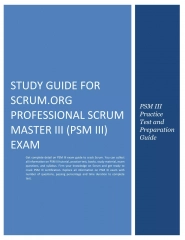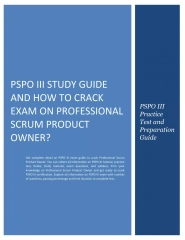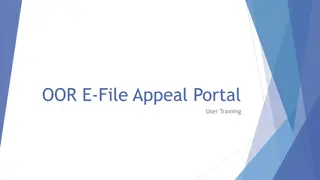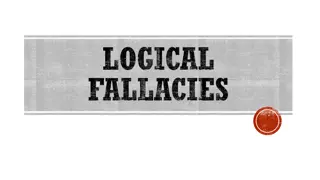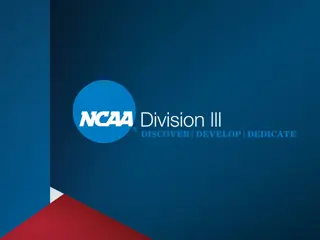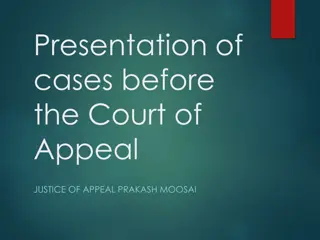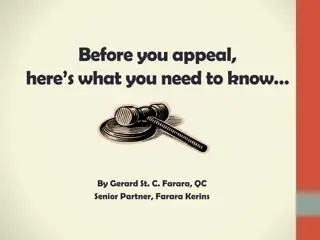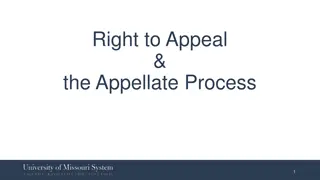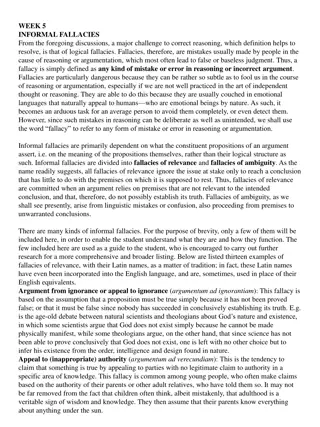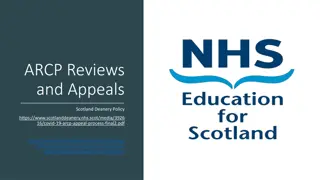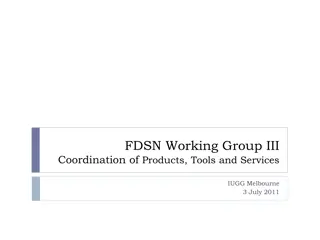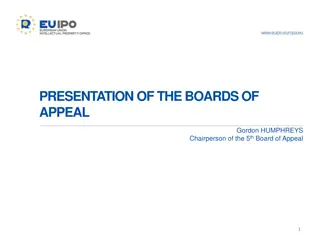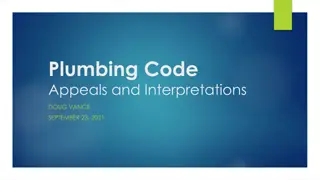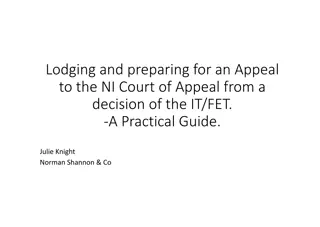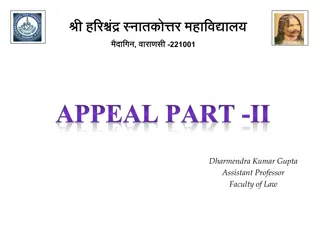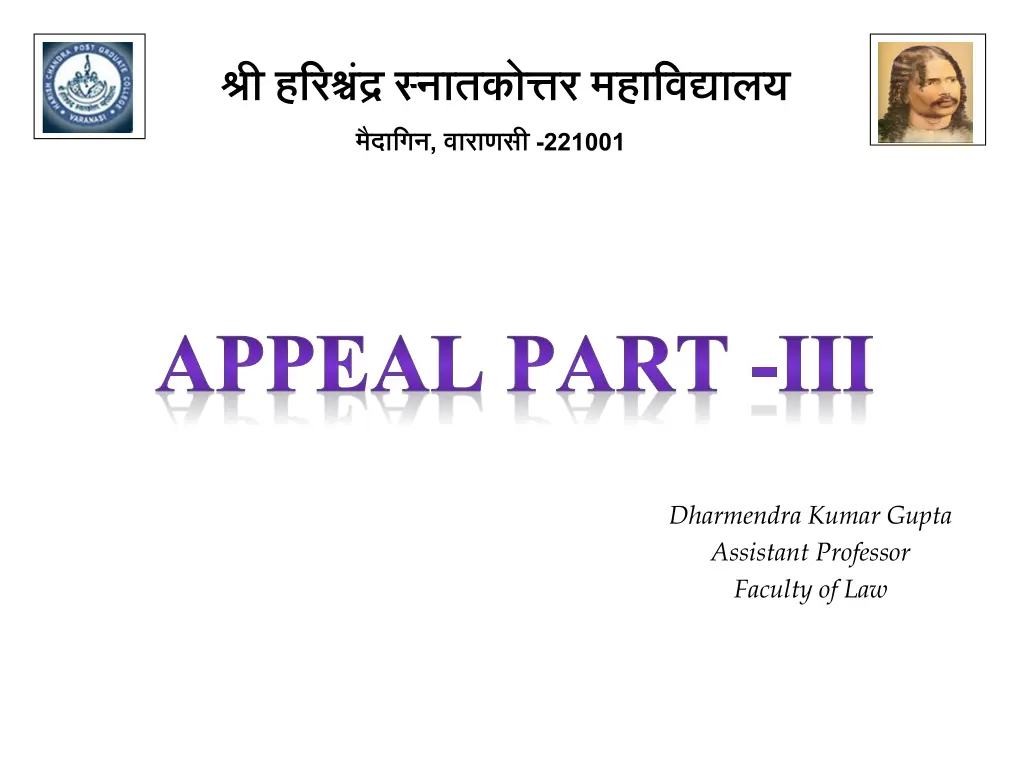
Appeal Procedures in Law: Remedies and Steps Explained
Explore the appeals process in law, including remedies such as appeal, reference, review, and revision. Learn about the conditions for filing appeals, restrictions on appeals, and the various steps involved in appeal proceedings. Understand the powers of appellate courts and the key considerations in appeal hearings and judgments.
Download Presentation

Please find below an Image/Link to download the presentation.
The content on the website is provided AS IS for your information and personal use only. It may not be sold, licensed, or shared on other websites without obtaining consent from the author. If you encounter any issues during the download, it is possible that the publisher has removed the file from their server.
You are allowed to download the files provided on this website for personal or commercial use, subject to the condition that they are used lawfully. All files are the property of their respective owners.
The content on the website is provided AS IS for your information and personal use only. It may not be sold, licensed, or shared on other websites without obtaining consent from the author.
E N D
Presentation Transcript
, -221001 APPEAL PART -III Dharmendra Kumar Gupta Assistant Professor Faculty of Law
Remedies to a person aggrieved by any decree or order passed by Court Appeal Reference Review Revision Second Appeal S.100-103,107,108 O.42 Appeal by Indigent Person O.44 Appeal to Supreme Court S.109,112, O.45 The Constitution First Appeal S.96-99A and O.41 Apple from Orders S.104-108 and O.43
First Appeal or Appeal from original decree- when lies? Save where otherwise expressly provided in the body of this Code or by any other law for the time being in force, an appeal shall lie from every decree passed by any Court exercising original jurisdiction the Court authorized to hear appeals from the decisions of such Court. An appeal may lie from an original decree passed ex parte.
When not lies? No appeal shall lie from a decree passed by the Court with the consent of parties. No appeal shall lie, except on a question of law, from a decree in any suit of the nature cognizable by Courts of Small Cause, when the amount or value of the subject-matter of the original suit does not exceed ten thousand rupees. No Appeal to dispute the correctness of preliminary where no appeal from preliminary decree.
Steps in Appeal Proceeding Memorandum of appeal Rule 1- 4 registration of memorandum and costs Rule 9-10 Rule 11 and 19 Rule 12 summary dismissal or fixation of day for hearing Rule 14 Notice of hearing Rule 16 Hearing of Appeal Rule 16 and 20 Rule 17 and 19 Rule 17 and 21 adjourn or dismiss in default or ex parte order Rule 24 Rule 27-29 steps on sufficient evidence or steps when no sufficient evidence or refer / remand to original court Refer-R.25-26A Remand-23-23A,26A Rule 30-37 Judgment and decree
Powers of Appellate Court Adjournment and addition of respondent- Rule- 20 Final determination of suit- S.107(1)(a) and R.24 Additional Evidence- S.107(1)(d) and R.27-29 Framing of issue and referring them for trail- S.107(1)(c) and R.25-26A Remand of case- S.107(1)(b) and R.23- 23A,26A Powers of court of original jurisdiction
Adjournment of Hearing Where it appears to the Court at the hearing that any person who was a party to the suit in the Court from whose decree the appeal is preferred, but who has not been made a party to the appeal, is interested in the result of the appeal, the Court may adjourn the hearing to a future day to be fixed by the Court and direct that such person be made a respondent. No respondent shall be added after the expiry of the period of limitation for appeal. unless the Court, for reasons to be recorded, allows that to be done, on such terms as to costs as it thinks fit.
Steps on Sufficient Evidence Where the evidence upon the record is sufficient to enable the Appellate Court to pronounce judgment, the Appellate Court may, after resettling the issues, if necessary, finally determine the suit, notwithstanding that the judgment of the Court from whose decree the appeal is preferred has proceeded wholly upon some ground other than that on which the Appellate Court proceeds.
Additional evidence when no sufficient evidence Rule 27. Production of additional evidence in Appellate Court. (1) The parties to an appeal shall not be entitled to produce additional evidence, whether oral or documentary, in the Appellate Court. But if (a) the Court from whose decree the appeal is preferred has refused to admit evidence which ought to have been admitted, or (aa) the party seeking to produce additional evidence, establishes that notwithstanding the exercise of due diligence, such evidence was not within his knowledge or could not, after the exercise of due diligence, be produced by him at the time when the decree appealed against was passed, or (b) the Appellate Court requires any document to be produced or any witness to be examined to enable it to pronounce judgment, or for any other substantial cause, the Appellate Court may allow such evidence or document to be produced, or witness to be examined. (2) Wherever additional evidence is allowed to be produced by an Appellate Court, the Court shall record the reason for its admission. Continue
Additional evidence when no sufficient evidence Rule 28. Mode of taking additional evidence. Wherever additional evidence is allowed to be produced, the Appellate Court may either take such evidence, or direct the Court from whose decree the appeal is preferred, or any other subordinate Court, to take such evidence and to send it when taken to the Appellate Court. Rule 29. Points to be defined and recorded. Where additional evidence is, directed, and allowed to be taken, the Appellate Court shall specify the points to which the evidence is to be confined, and record on its proceedings the points so specified.
Framing of issue and reference to court from whose decree appeal is preferred R.25-26A If such court has omitted to frame or try any issue, or to determine any question of fact, which appears to the Appellate Court essential to the right decision of the suit upon the merits, the Appellate Court may, if necessary, frame issues, and refer the same for trial to such court, and in such case shall direct such Court to take the additional evidence required. Such Court shall proceed to try such issues, and shall return the evidence to the Appellate Court together with its findings thereon and the reasons there for within such time as may be fixed by the Appellate Court or extended by it from time to time. Such evidence and findings shall form part of the record in the suit; and either party may, within a time to be fixed by the Appellate Court, present a memorandum of objections to any finding. After the expiration of the period so fixed for presenting such memorandum the Appellate Court shall proceed to determine the appeal. The Appellate court shall fix a date for the appearance of the parties before the Court from whose decree the appeal was preferred for the purpose of receiving the directions of that Court as to further proceedings in the suit.
Remand of case- S.99,107(1)(b) and R.23-23A,26A Where the Court from whose decree an appeal is preferred has disposed of the suit upon a preliminary point or otherwise and the decree is reversed in appeal, the Appellate Court may, if it thinks fit, by order remand the case. Court may further direct what issue or issues shall be tried in the case so remanded. Court shall send a copy of its judgment and order to the Court from whose decree the appeal is preferred, with directions to re-admit the suit under its original number in the register of civil suits, and proceed to determine the suit; and the evidence (if any) recorded during the original trial shall, subject to all just exceptions, be evidence during the trial after remand. No remand in appeal on account of any mis-joinder or non- joinder of parties or causes of action or any error, defect or irregularity in any proceedings in the suit, not affecting the merits of the case or the jurisdiction of the Court. But this rule shall not apply to non-joinder of a necessary party. S.99



